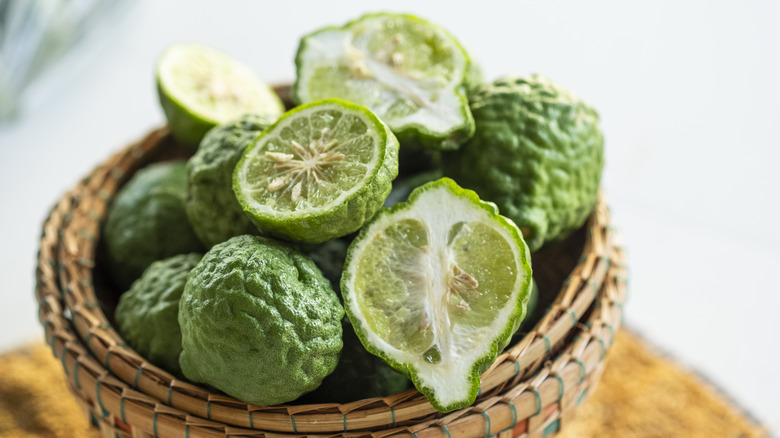These 9 Fruits Have An Unexpected Effect On Your Cholesterol
It's common knowledge that fruit is a healthy addition to a well-rounded diet. What's less widely known, though, is that certain kinds of fruits can help you manage your cholesterol very effectively. Incorporating these into your diet may help you lower stubborn low-density lipoprotein (LDL, or "bad") cholesterol levels and increase high-density lipoprotein (HDL, or "good) cholesterol levels.
Eating the right fruits can help you strike the right balance between these and your triglycerides, a type of fat that, when elevated, can increase the risk of developing cardiovascular health issues like stroke and heart attack. Both cholesterol and triglycerides are types of fatty lipids, and it's important to keep those in check to protect your health. Because high levels of both don't usually cause clear symptoms, it's important to be mindful of your health by getting annual physicals.
Using the information revealed in your blood work, your doctor might advise you to make dietary changes to improve your cholesterol. While fruit is a smart choice, it's important to eat it whole instead of juicing it. Dr. Romit Bhattacharya, M.D., a cardiologist at Mass General Brigham, explains, "You want to chew it and let your body digest the fiber, which signals to your body to be full."
Strawberries may naturally reduce your cholesterol
Sweet, juicy, and packed with vitamins, nutrients, and antioxidants, strawberries are easy to incorporate into a healthy diet. Studies have found that this bright red fruit may naturally lower LDL levels. Key to that effect is the presence of anthocyanins, which not only lend the berries their brilliant hue but are also linked to different heart-protective benefits.
According to Dr. Joel Kahn, M.D., they're virtual powerhouses if your goal is to improve your cholesterol. He tells Parade, "Strawberries have been found to lower cholesterol and reduce the risk of heart disease." Research supports this conclusion, as a 2008 study published in Metabolism revealed that people who ate three cups of strawberries daily for one month saw a decrease in their LDL levels. That's in stark contrast to an opposing group that followed a healthy diet but didn't consume strawberries.
Researchers theorize that its impressive impact on cholesterol may be because the fruit activates Nrf2, a type of protein that naturally regulates cholesterol and triglycerides. To reap their benefits, it's smart to eat them throughout the day, either as a snack, made into a smoothie, or tossed into a salad. There are multiple ways to enjoy strawberries, making them especially simple for the average person to enjoy.
Oranges contain multiple ingredients that may lower elevated cholesterol
Oranges are refreshing and most commonly enjoyed in juice form or as a treat on a hot summer day. If you have high cholesterol, though, it may be worth adding oranges to your diet year-round. The nutrient-rich citrus fruit works in multiple ways to help you manage your lipid levels. The benefit is largely due to both its fiber content and, according to Dr. Leann Poston, M.D., MBA, M.Ed, the plant sterols that prevent the body from absorbing dietary cholesterol (via Parade).
Additionally, explains registered dietitian Alex Caspero, MA, RD, RYT, to Parade, "A large orange contains about four grams of fiber, which is 16% of the recommended amount for women each day." The key is that oranges contain soluble fiber, which thickens to stabilize blood sugar levels while also preventing fat absorption to keep cholesterol levels in check.
Since the fiber lives in the pulp, it's important to keep that in mind when determining the best way to incorporate the fruit into your diet. Even if you're an avid orange juice drinker, if yours is pulp-free or has minimal pulp, you won't get the benefits of the fiber to lower your cholesterol. Aim to consume whole oranges instead of just the juice, or add a few slices to a salad or place a few in a wrap for lunch or dinner as a sweet addition to a savory meal.
Grapes improve gut bacteria that may regulate cholesterol levels
Grapes are a sweet and effortless snack — exactly the type of fruit that anyone can enjoy on the go, making it especially easy to add to a diet. What may be surprising is that their ability to lower cholesterol is achieved via the gut. The humble grape is packed with fiber, phytonutrients, and polyphenols, which work extraordinarily well to improve lipid levels, says Dr. Zhaoping Li, M.D., PhD, chief of clinical nutrition at UCLA Health. "It also gives us nutrients that feed our gut bacteria, making the microbiome a much better community of good bacteria while promoting gut health."
It's thought that grapes may increase Akkermansia muciniphila, a type of bacteria that studies have found may slow your body's cholesterol production. Researchers found that as this bacteria proliferates in the guts of animals, it can minimize the gene activity that is specifically responsible for making cholesterol. Additional research is still required, and it's a promising additional benefit — but even without it, grapes are high on the list because of the phytonutrients that lend them their color.
Among those is resveratrol, a potent antioxidant that can protect cardiovascular health. "That's the reason we think drinking a small portion of red wine is helpful in preventing heart disease," explains Dr. Li. Studies have found that resveratrol "significantly decreased total cholesterol." Grapes can be enjoyed as they are, or frozen for an icy treat.
Figs can bring down your cholesterol levels
Sweet figs may not be the first fruits that you think about when considering how to most effectively lower your cholesterol. However, the chewy food is actually a nutrient-rich powerhouse rich in a soluble fiber called pectin. This brushes out the triglycerides and reduces your cholesterol to support your heart health.
Per Mayo Clinic, consuming 5 to 10 grams of soluble fiber daily can have a marked effect on reducing LDL cholesterol. More specifically, the fiber behaves like a binder, making it easier for your body to absorb the cholesterol and reducing the strain your liver would otherwise have to do to absorb it. That, in turn, increases cholesterol excretion and brings down your levels as a result.
In some cases, you may need to take a medication called statin to reduce your cholesterol. Doctors typically recommend this if they deem that lifestyle changes alone will not be effective or if you are at higher risk of developing a cardiovascular health problem. However, combining the statin with a soluble fiber-rich diet may make an enormous difference in improving the medication's efficacy (per Medical News Today). There are a variety of ways to enjoy figs, such as raw or combined with cheese or nuts.
Bananas consumed daily can lower your cholesterol
The convenience of bananas is undeniable, as they're one of the few fruits you don't need to wash. They're the very definition of "grab and go" snacks, which means it's especially easy to make them a key part of your cholesterol-lowering regimen. The key to their potency is the soluble fiber, which reduces the bad cholesterol. At the same time, bananas are also beneficial for heart health. As the fiber binds the cholesterol to the digestive tract, it ensures that it's ushered out of the body before it has the chance to accumulate in your bloodstream.
Bananas are actually rich in both soluble and insoluble fiber, which is an outstanding combination for digestive health. Both types of fibers play important roles in this process: the former is the absorbent type that promotes soft, healthy stool, while the latter increases bulk. This is a powerful combination, as it supports more efficient elimination from the body of both waste and cholesterol.
And bananas also happen to be packed with heart-healthy antioxidants, like dopamine. By reducing oxidative stress on the body, inflammation levels may come down and protect the heart from future damage. Bananas, then, play an especially integral role in safeguarding the blood vessels from damage and reducing one's risk of cardiovascular issues.
Guava has been found in studies to decrease bad cholesterol
You might associate guava strictly with the tropics, but you'll want to make it a key part of your own kitchen once you discover just how effective it can be in regulating cholesterol. In particular, the juicy fruit contains an impressive medley of dietary fiber, antioxidants, and potassium, making it an especially vital addition to any heart-healthy diet.
Unsurprisingly, it's guava's abundance of fiber that is most closely indicated for reducing high cholesterol. The soluble fiber binds to the cholesterol, helping to prevent it from collecting before your bloodstream has the opportunity to absorb it. In fact, a 2005 study in Methods and Findings in Experimental and Clinical Pharmacology found that guava leaf extract not only reduced bad cholesterol but also increased HDL cholesterol levels. Additional research (via the American Journal of Cardiology) revealed that consuming ripe guava prior to eating a meal not only decreased blood pressure, but also brought down total cholesterol levels over the course of 12 weeks while improving good cholesterol levels.
Guava is a refreshing treat to enjoy in myriad ways. Some may like to have it fresh, while others might want to prepare a tropical fruit salad by incorporating it with other healthy fruits like pineapple, papaya, and mango.
Kiwi is a great source of soluble fiber to naturally reduce cholesterol
Kiwi is a nutritional powerhouse that shouldn't be overlooked if you're hoping to naturally lower your LDL. The little green fruit is very rich in nutrients, with an abundance of soluble fiber, polyphenols, and vitamin C, all of which are known to have a positive effect on cholesterol levels. In fact, according to 2009 research in the International Journal of Food Sciences and Nutrition, consuming kiwi may raise levels of HDL cholesterol, ensuring greater protection for the heart.
Like bananas, kiwi contains both soluble and insoluble fiber, which means it offers assorted benefits linked to both lower cholesterol and better digestion. And kiwi is an especially important addition to your diet for lowering triglyceride levels. A 2015 study in the Nutrition Journal found that consuming at least one kiwi weekly could have a positive effect, both in reducing triglyceride levels and improving HDL values.
Kiwi can be sweet and sometimes tart, but it's a very versatile fruit that is typically eaten on its own. However, you can also incorporate it into a crisp green salad for an artful and contrasting flavor, or chop it over yogurt and add nuts for a healthy breakfast option to start your day.
Bergamot has been found to lower cholesterol in just weeks
Bergamot is a type of citrus fruit that is largely recognized for its heady fragrance. While its aroma may be its most popular trait, its cholesterol-reducing properties shouldn't be overlooked. In clinical trials, the Italian fruit was found to reduce LDL levels and consequently improve total cholesterol levels (via Integrative Food, Nutrition and Metabolism). What's more, additional studies found that HDL levels actually increased when bergamot was administered. The researchers deduced that this positive effect may be due to its polyphenol content.
Interestingly, another review reported that bergamot may even be an effective option for managing cholesterol levels among those who are intolerant of statin medications (via Critical Reviews in Food Science and Nutrition). While your doctor isn't likely to advise you to take bergamot as your primary source of treatment, it may not hurt to incorporate it into your diet.
Because it is acidic and boasts an occasionally bitter flavor profile, bergamot isn't commonly eaten on its own. However, the benefits of bergamot can still be derived by using the essence from the rind and zest as flavoring. For example, you can use it to flavor a beverage (like tea) or incorporate it into your baked goods for a twist on a classic recipe.
Watermelon contains a cholesterol-lowering antioxidant called lycopene
Due to its lycopene content, watermelon is a delicious and valuable addition to a diet designed to reduce cholesterol. This potent antioxidant is a type of carotenoid that is known for its ability to minimize inflammation in the body and regulate levels of healthy HDL cholesterol. At the same time, the phytosterols in watermelon may reduce LDL levels (via Medical News Today).
According to Dr. Sean Heffron, M.D., a cardiologist at the Center for the Prevention of Cardiovascular Disease at NYU Langone Health, this and other fruits play crucial roles in protecting the heart. "It's beneficial from a blood pressure standpoint," he says to Today, "but also a weight maintenance standpoint and cholesterol standpoint." He adds that watermelon itself is "[d]elicious and quite filing."
You can purchase a large watermelon, chop it up, and store it in the fridge to enjoy whenever you crave a crisp, refreshing, and sweet snack. It's also popularly combined with feta cheese to make a refreshing salad on warm days. Some even slice it thinly and eat it with prosciutto or with caprese for a unique contrast in flavors.
Even naturally occurring carbs in fruit can raise triglycerides
Fruits of all kinds are globally hailed for their incredible health benefits, and those go well beyond improving cholesterol. However, they're also sources of carbohydrates — and even these naturally occurring carbohydrates can affect your triglyceride levels. Elevated amounts of this fat could potentially increase your risk of developing cardiovascular disease, so it's important to be mindful of that when incorporating fruit to improve your health.
The culprit is fructose, which is the kind of sugar found in fruit that's known to increase triglycerides. Usually, though, the ones most likely to contain especially high fructose levels are canned and dried fruits. Eating an abundance of sucrose-rich fruits, like bananas, grapes, or watermelon, could theoretically cause your triglycerides to spike, so being mindful of what you consume in your effort to reduce cholesterol can make a big difference.
If you're concerned about this effect, focus on incorporating low-fructose fruits to protect your triglyceride count. Those include kiwi, citrus fruits like bergamot, and strawberries.











